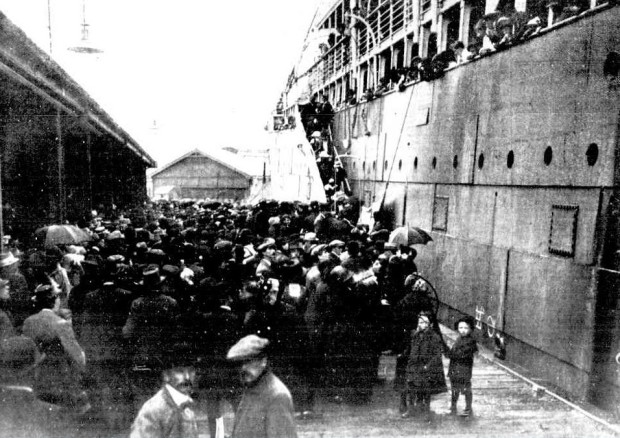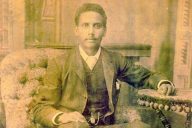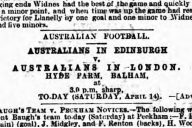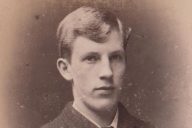Station Pier in Port Melbourne was the first point of entry for hundreds of thousands of Australian immigrants seeking a better life in the The Lucky Country. One hundred years ago, during the bad old days of the White Australia Policy, what was predominantly an Anglo-Saxon influx also incorporated the odd member of the “Dago” variety aka a person of Southern European descent. Post World War II, this Mediterranean trickle became a human flood and helped turn Melbourne into a vibrant multicultural metropolis.
One of the quickest and most effective ways for the new foreign arrival to ingratiate himself with suspicious locals was to become a more parochial, more one-eyed barracker of the football club of their new suburban abode. It was new turf, but it was also their turf, be it Carlton, Collingwood or Richmond.
Shoot Farken is proud to reprise the brilliant satirical tale of Tony, the hapless Bulgarian cum South Melbourne barracker, and Porky White, the larrikin, which was first published in Melbourne Punch as “Letters of Naturalisation” by MAX. A. on May 16, 1912.
The days of Melbourne’s mono-culturalism and, alas, more recently, suburban footy tribalism have since past. When I stumbled upon this gem, in the city’s wonderfully deep literary trove, I thought it would be criminal not to share this laughter filled, yet insightful, time capsule of Melbourne’s “colourful” early 20th Century street and football culture.
Letters of Naturalisation
By MAX A.
“These here blokes,” said Porky White, “ain’t no better than animals. Irishmen I can stand. Scotchmen can be put up with, for all they look like they come out of a cage, an’ talk like a man spittin’ out ‘is teeth. Englishmen out uv the country farms, that come ‘ere to be agriculture labourers, are ‘armless enough after you’ve took ’em down for the few quid they’re brought with ’em. But, bloomy, this ‘ere is a shipload of all sorts. There’s kinds in there that I never seen before, and I’ve watched a good many come an’ go.”
Porky was leaning against a railing on the Port Melbourne pier, alongside which an immigrant steamer had lately tied up. His remarks were not quite true, being exaggerated by his natural inveterate hostility to all immigrants and strangers. The vessel was loaded mostly with Englishmen, Irishmen and Scotchmen; but it had a cluster of Germans, a stray group of assorted Dagoes, and one family of Bulgarians. These last had chiefly been the cause why Porky’s ire was aroused. In his fervent Australianism, Porky hated all foreigners except such as had black skins and came into the Commonwealth under contract to take part in prizefights. These he honoured with a genuine hero worship. But the Bulgarian who stood near him did not look like a pugilist; and so Porky, chewing a piece of string because for the moment he had no tobacco, eyed him with extreme disfavour.
“But this won’t buy the baby’s boots,” Porky said suddenly, remembering that he was quite broke, and that the morning was going by without profitable employment. He slipped down into the crowd on the pier, and by bumping into a Yorkshireman who was carrying a huge wooden trunk, succeeded in creating a scene of momentary confusion, with enough jostling and pushing to allow him to obtain possession of a leather purse containing no less than twenty-seven shillings. This being a satisfactory day’s wages, he began to walk away from the pier at his leisure. Then he discovered that a large, innocent Bulgarian was beside him.
“I wanta lodge-house,” the strange foreigner remarked. Porky’s previous gaze of interest must have been the magnet that attracted him to the enterprising young Australian’s side. Now Porky measured him still more closely with his eye. The Bulgarian was apparently simple natured. Round his body there was probably a belt with some money in it. Porky immediately decided that he would recommend the stranger at the select mansions where he himself resided.
“Right-oh,” he said, cheerfully. “The best place for you to live is South Melbourne. Osprey Street for choice. You come along with me.
“I wanta work,” the Bulgarian added, and Porky nodded assent again. It was a desire which never afflicted him, but he knew other men suffered from it.
“What you workee at?’ he asked, falling naturally into Chinese-English to make himself better understood.
“I milka cow, feeda pig,” the Bulgarian replied, summing up his whole life’s experience in five words.
“Right-oh,” said Porky with enthusiasm. “South Melbourne’s the place for you. It’s one of the ‘omes of the great rooral industry of dairy-farmin’. I’ll get you a job in a dairy. I got a friend who owns several.”
“You say what?” the Bulgarian interrogated.
“Me gettee you job. You feedee pig welly soon,” Porky explained; and may have been understood.
“‘Ere’s where you live,” Porky said presently, as he led his friend into one of a mean row of cottages. “This is your room, and that’s your bed.”
The Bulgarian nodded his head in comprehension, and smiled in the appreciation of the familiar environment of dirt, untidiness and negligence.
“Now, you stop ‘ome,” Porky went on, fearing that the expected haul might fall into other hands than his. “I’ll go out findee you good job. If you should go out, remember where you live. South Melbourne. Don’t forget it. South Melbourne.”
“I live South Melbourne,” the immigrant said submissively.
And, showing him where to find food and fuel, Porky went out to a football match.
That turned out to be the Saturday afternoon of the famous riot. It was the day when Collingwood beat South Melbourne by one point, and, in rage at the narrow defeat, the South Melbourne barrackers charged the ground, sent the umpire to hospital, and split the skulls of two members of the Collingwood ruck. All that night fights raged outside every side-street hotel in South Melbourne, for Collingwood was seeking revenge, and instead of going home the Collingwood pushes had brought reinforcements from their own suburb.
Porky White had been engaged in three victorious battles when he met disaster. Unexpectedly he became engaged in a conflict where the odds against his side were about thirty to twelve. Bottles and boots were likely to dispose for ever of the forlorn South Melbourne dozen. They roared desperately for assistance.
“South ! South! South Melbourne!” they cried in appeal to the noisy night.
Then there was a yell like a jackal’s, and a wild figure with a bottle in each hand leapt into the fray! It had method and energy utterly flabbergasting to the feeble push from Collingwood in the first onset. It shouted in a fierce, spluttering language. But Collingwood closed in on Bulgaria, and there would have been one immigrant the less in Australia—when the Police came.
“What is he?” the J.P. asked testily on Monday morning.
“A foreigner your honour,” the sergeant answered. “And nobody cahn’t understand him.”
“Where are you from?” the J.P. said to the prisoner.
“Sout Melbourne,” the battered figure replied promptly.
“What nation are you?”
“Sout Melbourne.”
And no more could be learned, for the Bulgarian was like the lady who wandered to England on the passport of two words—”London, Becket.”
“Dismissed,” said the J.P. “And keep out of bad company, my man.”
“Sout Melbourne,” said the Bulgarian when out in the street, and he walked into the open arms of Porky White.
“This bloke,” said Porky to his mate and to the dirty man behind the bar, “is a South Melbourne barracker, and as good a man as us. Who do you barrack for, Tony?”
“Sout Melbourne,” the Bulgarian grinned.
“That’s a good enough interduction f’r any bloke,” the dirty man agreed, and shook Tony by the hand. “It makes ‘im a naturalised citizen straight awf.”
“‘E’ll stop ‘ere to-night,” said Porky, and took the dirty man aside. They talked low and earnestly, with many glances at the Bulgarian waist, round which a belt might be supposed to be concealed.
Feature photo of immigrants arriving on The Gothic at Station Pier, Port Melbourne, first published in The Leader on September 21, 1912.
















